- Home
- Matthew Pearl
The Technologists Page 15
The Technologists Read online
Page 15
“Here, old fellow,” Bob said, dropping the coins into the man’s hand. “Buy yourself some chowder. Our united thanks for your help.”
“From the area of the damage, then, it appears the event extended from here—the Custom House, and Central Wharf—to there,” Edwin concluded as they left the wharf rat behind.
“That’s Long Wharf,” Bob said.
“Edwin is right,” said Marcus. “The combination of soft iron and the motion of the waves would have to generate an area extending to those three or four wharves and out to sea, where the magnetism would have interfered with all navigational instruments in that region. How is it possible an amount of iron that large could be in position to do this without being seen?”
Edwin peered up and down the wharves with an unsettling sense of the true magnitude and difficulty of the task they had undertaken. Not only to discover what transpired, but to persuade others. They were trained in understanding events in scientific terms, not in convincing unscientific minds to do the same. “We need to find evidence.”
“They’ve been removing the debris,” Bob said. “The evidence won’t be anywhere up here.”
Edwin peered down doubtfully into the vast expanse of the harbor and listened to the sounds of the tide. As if speaking for the deep, mysterious currents, Bob put his arm around his friend’s shoulder and pointed with his other hand. “Out there, Eddy. There’s proof somewhere out there!”
“Now we merely have to walk underwater to find it!”
For once, Bob had no answer.
“Fellows, over here!”
Edwin and Bob followed Marcus, who was studying a circular tacked onto a telegraph pole.
“What is it, Mansfield?” Bob asked.
“What do we do with it, Marcus?” Edwin asked after he read it.
“Follow the directions,” Marcus replied. “And begin to collect our answers.”
A.B. SEAMEN WANTED.
Apply onboard schooner Convoy
—E. L. BEAL, CAPTAIN
* * *
WHARF RATS, like the ubiquitous rodent from which they received their name, moved from hole to hole for shelter. After eating his chowder at one of the dingy restaurants on the harbor, the red-faced wharf rat climbed into the fish house, where excess portions of the day’s catch were stored, and where he’d often gone for shelter, especially these days, with the police swarming around. He was startled when his wrist was grabbed as he was stepping through the creaky doors.
“Honor bright, I’ve had enough of you!” he cried, thinking it was one of those collegies come back.
He turned to find himself in the grip of a fever dream, staring at a ghoulishly disfigured face that seemed to ripple and peel as he shrank back in horror. The hood that partially shaded it did nothing to obscure the fiery glare of its miserable owner, which burned above sunken, cadaverous cheeks and an unnatural, almost incandescent orange mustache. Behind the apparition was a taller fellow in a checkered waistcoat and bowler hat, with a stoic, sleepy demeanor that contrasted almost comically with his companion.
“I understand from some of your fellow worthless vagabonds that you’re known to frequent Central Wharf picking up rags and other rubbish. I’d like you to tell me what you saw at the time of the disaster on the fourth of April.”
“I just told ’em!” the wharf rat protested, then regretted it.
“Who? Who did you tell, you old fool?” demanded the hooded stranger, shaking him violently.
“Those nosy collegies a few hours ago—they looked like collegies, anyway. They were here asking about it, I vow it! I think they went toward Long Wharf. Ask around—they were putting their noses everywhere—if you don’t believe me!”
The man in the hood nodded to his companion, who ran off. Then he turned back to the old man, demanding whatever information he could remember. He asked the same question posed by the collegies—whether there had been anything out of the ordinary that day.
More prepared than in his previous encounter, the wharf rat had begun to compose himself and smelled opportunity. “Well, there was something, now that I muse on the topic,” he said slyly. “What will you give me for it, kind gent?”
Without warning, the nightmare erupted, slapping the older man across the face again and again until the wharf rat fell to his knees. His assailant rifled through a pile of discarded fish parts, grasped his victim’s head by the hair, and thrust a fish bone down his throat.
“What I will give you in return,” he said, breathing heavily, “is your pathetic life.” The wharf rat choked and gasped for air until the bone was yanked from his mouth.
“There was a sailboat!” the vagrant answered between tears. “I saw it cast off, and then I noticed that it laid anchor in a strange place—well out from the piers. When the commotion began, I looked again, and I thought I saw it in the distance, sailing away, undisturbed.”
“Did you see anyone on it? Do you remember anything about it? Do you?”
The wharf rat flinched and nodded, sputtering. “It was too dark … I didn’t see who was at the helm … I remember the name. Grace. The boat was called the Grace. I saw it when a light passed over the boat. That was my poor loving mother’s name, Grace, my dear mother, Grace, honor bright! That is why I remembered. That’s what I saw, if I saw anything more than that, shoot me!”
XVIII
Enter the Technologists
“THAT’S SOMETHING YOU DON’T SEE every day, Mansfield.”
During classes, Marcus would scribble notes combining formulas, then cross them out and start again, until he had to stop to cradle his aching hand and flex his tingling fingers in slow agony, trying his hardest not to allow the pain to bring with it memories of Smith Prison. This was how he was occupied before the start of the latest chemical manipulations session, when Hammie leaned over his shoulder.
“What is?” Marcus replied with unconcealed annoyance in his voice.
“Hall is usually the bore who can’t stop writing everything down, not you.” Hammie nodded in the direction of Albert Hall’s table. Sure enough, Albert’s hand was flying across the page, leaving behind a trail of immaculate writing, with pauses only to sharpen his pencil with a small knife blade, or to vanquish his long cowlick from his brow. “Hall there believes his notes will mark the beginning of a new epoch in polytechnical education, that they will someday be petted in a museum by scholars. I always thought you were like me, Mansfield.”
“How so?” he asked, surprised and suspicious of the rush of words—and the sentiment—coming from the enigma that was Chauncy Hammond, Jr.
“That science runs through your blood, not through your pencil,” he said with his off-center grin. “That you were born to know how things work, and make them work better. I make my class notes in the evening, as a test to my memory. Say, those don’t look like formulas for today’s demonstrations.”
Marcus casually closed his notebook as Hammie examined it. “I was working on some ideas of my own. Going ahead of class.”
Hammie nodded meditatively. “I’ve always done the same,” he said approvingly, yawning at him before returning to his own table. Bob nodded to them both nonchalantly as he passed their stations on his way to the chemical cabinet. Professor Storer, benevolently making the rounds of the room as the students prepared their demonstrations, was helping Bryant Tilden measure out a chemical. Marcus’s eyes then fell on the two small, tilting mirrors Albert kept on his table, which he had explained in the past would allow him to catch anyone trying to copy his notes. But Marcus wondered what reflections those mirrors could capture from the array of other glass objects and vessels in the room. Was it possible Albert could see other students’ notes—could see Marcus’s?
The catastrophe that had struck the State Street district presented an even more discouraging challenge to unravel than the harbor did. Marcus’s notes dismissed theory after theory about which chemical compound would produce the results they had seen with their own eyes, and that witnesses d
escribed in whispers and in the newspapers, however little any of them understood it.
He opened his notebook again and found a scrap of paper lodged inside, written in a kind of cipher, but recognizable as Bob’s hand, ordering a meeting in the stairway between the third and fourth floors during their study period. At the appointed time, Marcus found Edwin there, waiting with a look of suspense and his own note from Bob. Before either of them could say a word, Bob burst into the stairwell from the third floor. Moving between them, he looped his arms into theirs and led them up in a full gallop.
* * *
“HERE!” Bob called. “Now we can hold our conferences in perfect peace and privacy.”
“This is where you want us to meet, Bob?” Marcus asked. “The roof?”
“Only temporarily,” Bob assured him, closing the door behind them. “Haven’t yet found a better space with more privacy than the storeroom, but I vow I will, Mansfield. See here. When have I let either of you down? I was able to secure the most recent Boston map from City Hall during the break, and have marked off the area of the second incident, using our own observation and the clippings Rogers collected from the newspapers.” Flattening the map on the stone balustrades that squared the roof, Bob pointed to his markings in the business district around State, Court, and Washington streets.
The wind was strong, but at least they could speak freely. Suspicious behavior was of course to be avoided in the building. They’d not be able to miss more than a few classes without opening themselves up to questions. For now, being eighty-five feet above the ground would provide the seclusion they needed. If they were to succeed in helping Rogers and the Institute, they would have to work invisibly. They would impose these rules and regulations on themselves, and even Bob, who normally chafed at restriction, could abide them, given the satisfying rebelliousness of their secret mission.
That would leave them only the early mornings, their afternoon dinner breaks, their brief study periods, and evenings. At least with Marcus rooming at Bob’s boardinghouse, they could all be in close proximity of the city. Unlike New York or Chicago, once you were inside Boston, any point in the city was fairly convenient to any other. Meanwhile, they had to continue preparing for their examinations, with Marcus cramming Bob and Edwin for engineering, Bob helping Marcus and Edwin read up in geology and surveying, and Edwin lending Bob and Marcus his mastery in physics and chemistry.
Bob drew another imaginary line around one portion of the map with his finger. “The chemicals had to be released somewhere centrally positioned within this circumference.”
“If we can re-create the chemical combination that was used—as we will with the technique that disrupted the compasses …” Edwin began.
“We hope,” Marcus said.
“We hope, yes,” Edwin agreed. “If we can somehow re-create the compound in a closed setting, then it would allow us to calculate how quickly and in what fashion it would have traveled through that area, permitting us to work backward to pinpoint its source.”
“I want to go back to where it happened,” Marcus said.
“Why?” Bob said with a shudder, then felt embarrassed at his reluctance. The ghost of Chrissy still lurked there, though he would not admit that out loud. “What I mean is, we were there already.”
“But that was before beginning our investigation,” answered Marcus. “Before we knew what to look for.”
“Very well,” Bob said. “First, we have other business. Eddy, you continue to draw up the engineering plans Mansfield has started for our salvage work at the harbor.”
“I will do my best—I am more a physicist than a machine man, you know,” Edwin said. “To a physicist, unchanging law is supreme, but to a machine man the law must be always changing.”
“Flat nonsense! You are a man of all sciences,” Bob replied. “Anyway, we have Mansfield, Tech’s best mechanical engineer, to coach you. And if I am not the strongest geologist and metallurgist in the Class of ’68—well, I think I must be, really.”
“Hush. Look,” Edwin said in a whisper. Down below, behind the building, Professor Eliot stood smoking a cigar, holding a long, narrow case, the kind lined on the inside with tin and used to transport chemicals or sensitive equipment. They crouched down and watched.
To their surprise, a horse and carriage drove up the path behind the Institute, on the northerly side, along Newbury Street. This was rare in the middle of the Back Bay, which was usually deserted this time of day.
Professor Eliot seemed to be expecting the encounter. He walked swiftly over, leaned in through the window, and returned inside the building empty-handed, throwing his cigar into the dirt.
“He must have put the case into the carriage,” Bob said, as they knelt behind the protection of the balustrade. “Did he see us?”
“He will not hesitate to reprimand us if he did,” Marcus whispered.
“We don’t want Eliot’s eyes trained on us any more than necessary.”
“There is something else we don’t want, Bob,” Marcus commented. “When you went to City Hall to look for the map, some of the fellows noticed you were gone. They were asking about you.”
“Am I that important and handsome?” Bob bellowed with his deep bass laugh, and tossed his head.
“You are always the one leading the sports in the dinner break,” Marcus reminded him. “I’m afraid your popularity will work against us. How are we to go anywhere during school hours, if your absence is wondered at?”
Bob nodded, thinking this over. “I have a plan for that, too.”
“What is it?”
“Don’t rush so, Mansfield! I don’t have one yet, exactly, but I mean to have one soon.”
Their heads swiveled around as the door to the roof opened.
“Eliot! He saw us,” Edwin gasped.
Before they could try to conceal themselves, Darwin Fogg appeared instead, lifting his hat to them.
“Well,” Darwin said, “are you boys supposed to be up here?”
They each waited for one of the others to answer.
“No,” Edwin said.
“And you’re the smartest fellow in the college?” Bob whispered to Edwin.
“Well, neither am I. I should be cleaning out the supply closets at this hour, but”—Darwin removed a cigar from his pocket—“don’t tell Albert Hall, will you? I like being the professor of dust and ashes here.”
“We like you being here,” Bob said.
“You know,” Darwin mused as he took a puff and enjoyed the view out to the Charles, “other than not being able to smoke inside near your equipment, I’ve liked working in a college where students like you fellows aren’t all well shaven and cold-blooded, but running around digging through mines and such when they’re not in classrooms. It makes for true entertainment.”
* * *
THE NEXT MORNING, Marcus and Edwin claimed their seats in Squirty Watson’s mechanical engineering class. Deep shadows framed their red eyes, the residue of having stayed up half the night at Bob’s boardinghouse, reviewing lists of chemical compounds and drawing up engineering specifications, on top of spending most of their free time during the day on the roof of the Institute. Fortunately, the days had been clear and a little warmer, but also sunny enough that their skin was as tan as sailors’. Then came a day of strong winds in advance of a heavy rainstorm that blew so much dust from the empty lots of Back Bay that the roof was useless. They could hardly see their hands in front of their faces, much less their growing sheafs of notes and diagrams. When Marcus woke up that morning, Bob had already gone, and by the time he reached the Institute Bob hadn’t yet appeared there. He looked over his shoulder and exchanged a worried glance with Edwin, who was compulsively checking his watch. He mouthed, “Where could he be?” just as Bob slipped in the door and hurried to a table. Watson appeared a moment later, as well dressed in the Parisian style and apologetic for his tardiness as usual.
“Greetings, gentlemen! Now class can begin,” he said, as though so
meone were forever trying to teach class without him. “I have some very interesting things to show the class today. Oh, yes!” First was a lecture on the arrangement of machinery in mills for grinding. When Watson was at the blackboard, Marcus twisted his head to the side. Bob was waiting for his glance. He held up a shiny metal object just long enough for Marcus to see it. A key.
“A volunteer, if you please,” the professor said. They had moved on to the construction of bridges. Albert Hall braced his arm high in the air, his round face plumped up with anticipation, but Watson stopped in front of Marcus instead. “Mr. Mansfield. You can do us the favor. Break this.”
The professor handed him a pine strip twelve inches long and half an inch wide, and he broke it in half.
“Very good, Mr. Mansfield. You would make a fine backwoodsman. Now, come with me. Everyone, watch Mr. Mansfield and myself as we play seesaw.”
On the far side of his desk, Watson had constructed an isosceles triangle, using three sturdy pine strips, with a wire rod extending from the apex down to the base. A long strip of board was rested on top of the makeshift structure, which did not look trustworthy enough to support the weight of a small dog. Watson stepped up on one end and directed Marcus to stand on the other. The seemingly frail triangle supported both bodies without a problem.
A murmur of satisfaction filled the room, ejecting the well-honed cynicism of college seniors.
“Eh! I don’t want to see any expressions of surprise on your faces! That’s better. You see, Mr. Mansfield may break almost any stick in those strong hands of his. But remember when you write your examinations next month what I’ve said all year—in construction of a bridge, look for the placement of stresses. It is never about what appears strong or weak on the outside, but where the pressure falls. You won’t find this sort of demonstration at Harvard, by and by, with Agassiz and his pickled starfish. You can thank President Rogers for making demonstrations like this possible somewhere in America.”

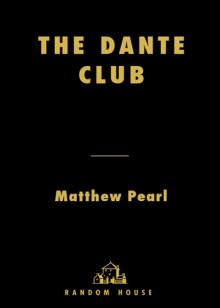 The Dante Club
The Dante Club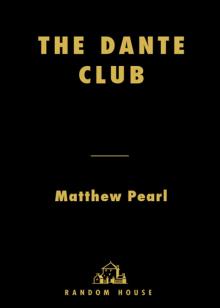 Dante Club
Dante Club The Poe Shadow
The Poe Shadow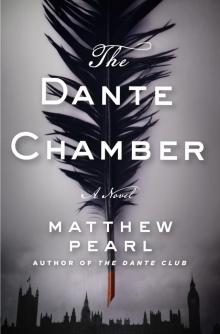 The Dante Chamber
The Dante Chamber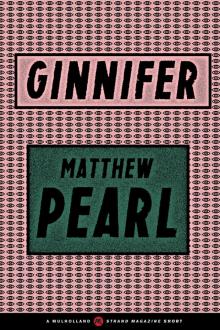 Ginnifer
Ginnifer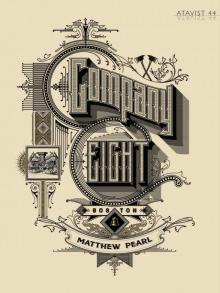 Company Eight
Company Eight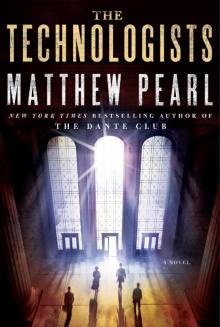 The Technologists
The Technologists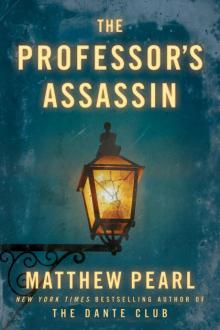 The Professor's Assassin
The Professor's Assassin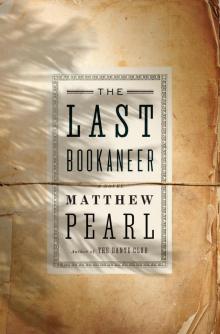 The Last Bookaneer
The Last Bookaneer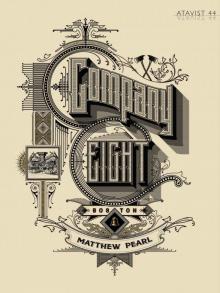 Company Eight (Kindle Single)
Company Eight (Kindle Single)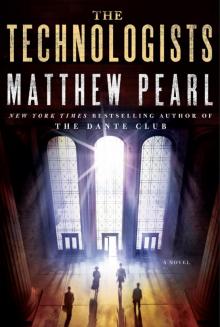 The Technologists: A Novel
The Technologists: A Novel The Last Dickens
The Last Dickens